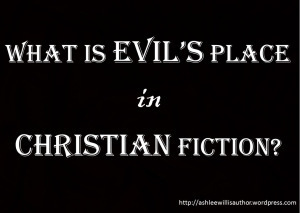True Evil in Christian Fiction: Where Do You Stand?
Two things happened recently which made me want to explore this question, which is a rather broad one: Should there be evil ��� true evil ��� in Christian fiction?
The first thing that made me begin thinking about it was a conversation I had with a family member. She told me that she couldn���t understand why books had to be so full of evil. She just wanted to be able to pick up a book that gave her a sense of peace and happiness. Why bad guys? Why horrible obstacles?
The second thing that made me question this was a 1-star Goodreads reviewer who emailed to explain to me that she didn���t enjoy my book because it was ���filled with witchcraft and premarital romance.��� This example is a bit extreme, especially if you’ve read my book, and I have to admit I didn���t let it effect me greatly. In my book the small amount of magic used is certainly not glorified (although magic is a whole other blog post, honestly …). Also, I’m happy to say that I myself didn���t venture into marital romance without a bit of premarital romance first ��� I���m afraid of what the consequences would have been if I had, and certainly wouldn’t wish such a thing on my characters or anyone else! :)
However, after hearing the words and views of my reviewer and of my relative, I still had to wonder. Where does evil have its place in Christian fiction?��What do you, as  readers and Christians, believe?
readers and Christians, believe?
Is magic wrong, even when it is used solely by the antagonist? Is romance (the holding hands, kissing, puppy love kind) wrong for Christian teens (or anyone else, for that matter) to see? Where do you draw the line? And is it wrong to depict evil ��� you know, the kind that makes you shiver and feel like your stomach has dropped ��� within the confines of a Christian story with a God-glorifying theme?
I���ll admit, sometimes my tastes in reading and my personal beliefs don���t perfectly coincide. I suspect we���re all guilty of this in one way or another. I like reading about epic battles, and magic, and mysterious murders. Does that mean I���m going to grab a sword and run someone through, or sit pining for my letter from Hogwarts to come ��� or worse yet, go kill someone? No, not even a teensy bit.
In my opinion, reading about sin only becomes a sin itself when you find pleasure in the evil you see. More so when you not only take pleasure in reading about it, but take it to the next level and perhaps indulge in it yourself. As I heard Bob Ross say (as he was painting happy trees ���) on a recent re-run, ���You have to add the dark to make the light more striking.��� He was speaking about painting, of course, but the minute he said those words, I thought, ���Yes! That���s exactly it!��� And so it is.
It was much like I told my relative after she expressed her concern over evil in stories. I explained to her that, as a writer myself, my desire is for my stories to mirror the world we live in, the battles (sometimes invisible) we fight every day against an evil that is all too real. To show the reader that evil (whether it takes the form of magic or murder or any other immoral thing), and then to show her a heroine much like herself who overcomes that evil ��� what could be more powerful than that? What else could leave such a deep sense of peace? Even ��� no, especially ��� if that hero or heroine overcomes the evil with grace and mercy and love, things God fully intends us to overcome our real-life troubles with.
So where do all these preferences and beliefs, so seemingly at war with each other, leave me? With several questions, actually, for myself and for you:
Where do we draw the line when reading for entertainment about things we may not morally agree with?
What if truly evil things come only from the antagonist in a��story? Are they still wrong to read about?
If we protect ourselves from all thoughts, books, and talk of the things we don���t believe in or agree with, what could be the possible consequences of that, for better or worse?
How much responsibility do we take, as readers, for the direction of our thoughts and actions in relation to what we read, and how much responsibility lies with the author? What does that responsibility entail (for reader or author?).
You, as my readers and friends, have opinions that are extremely important to me. Opinions that I want ��� and need ��� to hear, if my future books are to be ones you will want to read. So what do you think? Do you have answers to any of these questions? Opinions? Questions of your own? I want to hear them!
____________
For some interesting and varying thoughts on magic and romance in Christian fiction, you may want to check out these articles:
Fantasy Magic and the Christian Author
How Far Should Couples Go in Christian Fiction?




